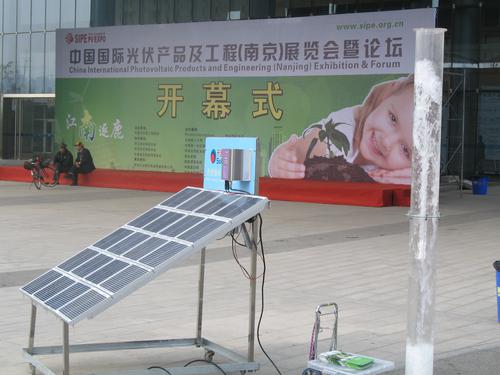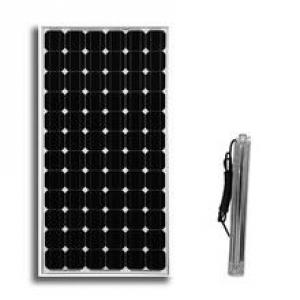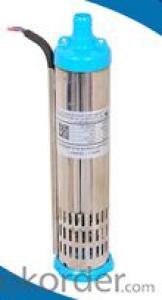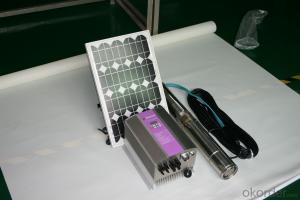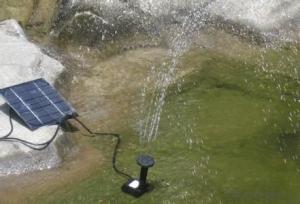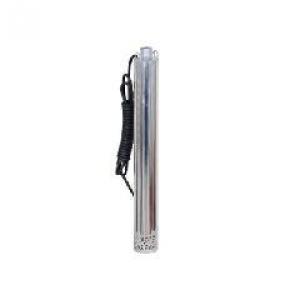Floating Solar Pumping System
- Loading Port:
- Shekou
- Payment Terms:
- TT OR LC
- Min Order Qty:
- 20 set
- Supply Capability:
- 300000 set/month
OKorder Service Pledge
OKorder Financial Service
You Might Also Like
Solar Water Pump is the pumping facility driven by solar energy, which consists of a solar pumping inverter and a pump. Solar water pumps kit is called solar pumping system combining with solar arrays designed according to different head and daily water flow for application. System is widely utilized for agriculture irrigation,desert control,pasture animal husbandry,city landscaping,daily water supply, etc.
In recent years, with the development of photovoltaic products from city application to huge demands of agriculture,pasture,desert areas, Solartech Solar Pond Pump has become the leading products combining photovoltaic industry with traditional industry such as agriculture water conservancy,desert control,daily water supply,city landscaping, etc.
Solar Pump driven by infinite solar energy, works from sunrise, and stops at sunset, need no connection to grid power nor diesel oil and battery. System can irrigate directly or store water instead of electricity in a reservoir. Solar fountain Pumps works with sprinkling irrigation, drip irrigation and infiltrating irrigation facilities, can be more efficient for water saving and dramatically lower the cost of using fossil energy.
Technical Features
Solar Water Pump is a pumping device powered by solar energy, consists of a solar pumping inverter and a deeo well pump, mainly used for agriculture irrigation, desert control, pasture animal husbandry, city waterscape, seawater desalination, living water supply and so on.
Use solar energy, need no connection to grid. Automatically operation, maintenance free.
Easy to install and move, high universality. Clean and green, high economic benefits.
Solartech solar pump kit also named solar water pumps, solar pond pump, solar borehole pump, solar funtain pumps, solar powered water pump, solar irrigation pump, solar deep well pump, and solar submersible pump.
Product Specifications
SPC830K700 | 3PH 380V 50Hz | 52-35m | 540-700m³ | 100mm | 4" | 250-300mm | 625-750VDC | 500-600VDC |
SPC837K270 | 3PH 380V 50Hz | 150-125m | 210-270m³ | 65mm | 2.5" | 250-300mm | 625-750VDC | 500-600VDC |
SPC837K330 | 3PH 380V 50Hz | 125-100m | 270-330m³ | 76mm | 3" | 250-300mm | 625-750VDC | 500-600VDC |
SPC837K420 | 3PH 380V 50Hz | 100-80m | 330-420m³ | 76mm | 3" | 250-300mm | 625-750VDC | 500-600VDC |
SPC837K540 | 3PH 380V 50Hz | 80-60m | 420-540m³ | 100mm | 4" | 250-300mm | 625-750VDC | 500-600VDC |
SPC837K700 | 3PH 380V 50Hz | 60-40m | 540-700m³ | 100mm | 4" | 250-300mm | 625-750VDC | 500-600VDC |
SPC845K270 | 3PH 380V 50Hz | 180-145m | 210-270m³ | 65mm | 2.5" | 250-300mm | 625-750VDC | 500-600VDC |
SPC845K330 | 3PH 380V 50Hz | 145-120m | 270-330m³ | 76mm | 3" | 250-300mm | 625-750VDC | 500-600VDC |
SPC845K420 | 3PH 380V 50Hz | 120-98m | 330-420m³ | 76mm | 3" | 250-300mm | 625-750VDC | 500-600VDC |
SPC845K540 | 3PH 380V 50Hz | 98-72m | 420-540m³ | 100mm | 4" | 250-300mm | 625-750VDC | 500-600VDC |
SPC845K700 | 3PH 380V 50Hz | 72-50m | 540-700m³ | 100mm | 4" | 250-300mm | 625-750VDC | 500-600VDC |
SPC855K270 | 3PH 380V 50Hz | 200-170m | 210-270m³ | 65mm | 2.5" | 250-300mm | 625-750VDC | 500-600VDC |
SPC855K330 | 3PH 380V 50Hz | 170-155m | 270-330m³ | 76mm | 3" | 250-300mm | 625-750VDC | 500-600VDC |
SPC855K420 | 3PH 380V 50Hz | 155-125m | 330-420m³ | 76mm | 3" | 250-300mm | 625-750VDC | 500-600VDC |
SPC855K540 | 3PH 380V 50Hz | 125-95m | 420-540m³ | 100mm | 4" | 250-300mm | 625-750VDC | 500-600VDC |
SPC855K700 | 3PH 380V 50Hz | 95-65m | 540-700m³ | 100mm | 4" | 250-300mm | 625-750VDC | 500-600VDC |
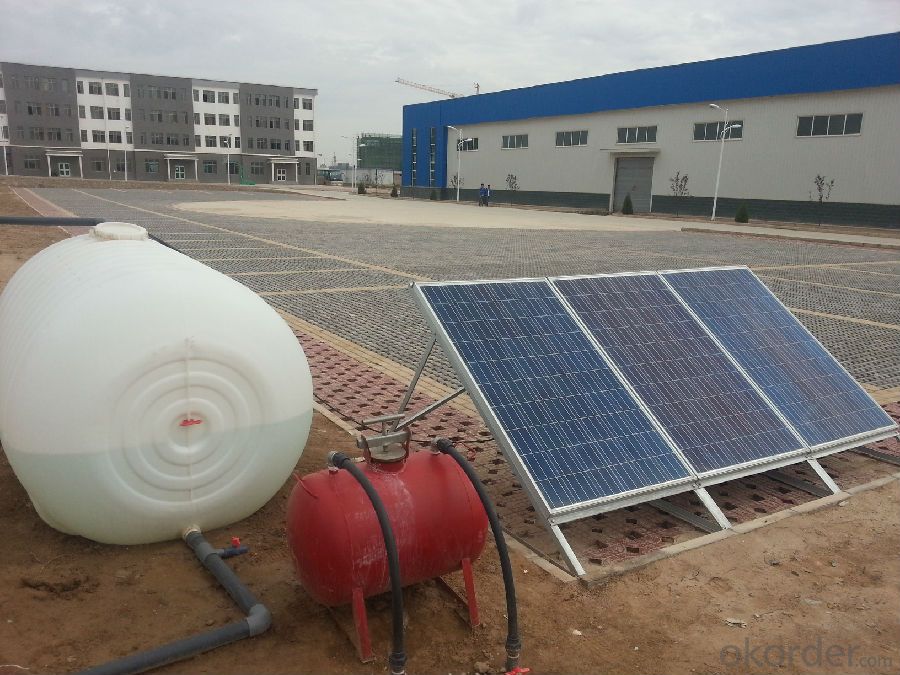
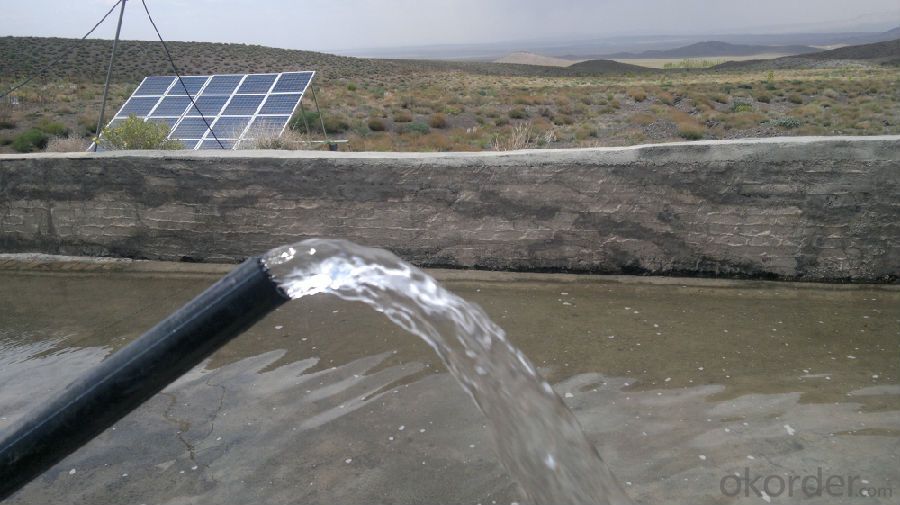
- Q: Are there any limitations to the duration of continuous operation for a solar pump?
- The duration of continuous operation for a solar pump is constrained by several factors. The primary limitation is the availability of sunlight, as solar pumps rely on solar panels to convert sunlight into electricity. Consequently, the pump can only function when there is enough sunlight to generate the necessary power. Moreover, the duration of continuous operation is influenced by the capacity and efficiency of the solar panels. If the panels have low capacity or are ineffective at converting sunlight into electricity, the pump may struggle to operate for extended periods. Additionally, the size and capacity of the pump itself can impose restrictions on continuous operation. If the pump is not designed to handle prolonged use, it may overheat or experience mechanical failures. Furthermore, weather conditions can impact the duration of continuous operation. Cloudy or rainy days can significantly reduce the amount of available sunlight, thereby limiting the pump's functionality. To address these limitations, some solar pump systems incorporate battery storage. These batteries can store excess energy generated during sunny periods, enabling the pump to operate during periods of low sunlight or at night. However, the duration of continuous operation still hinges on the battery capacity and the amount of stored energy. In conclusion, the limitations to the duration of continuous operation for a solar pump are primarily determined by the availability of sunlight, the capacity and efficiency of the solar panels, the size and capacity of the pump, and the presence of battery storage.
- Q: Can a solar pump be used for water circulation in fish tanks?
- Yes, a solar pump can be used for water circulation in fish tanks. Solar pumps are designed to be environmentally friendly and energy-efficient, making them a great option for maintaining water circulation in fish tanks. They can help aerate the water, improve oxygen levels, and prevent stagnation, which is essential for the health and well-being of fish.
- Q: Can a solar pump be used for water supply in orchards?
- Yes, a solar pump can be used for water supply in orchards. Solar pumps are an efficient and sustainable solution for irrigation in areas with access to sunlight. They can effectively supply water to orchards, helping to nourish and maintain healthy plants while reducing reliance on traditional energy sources.
- Q: How does a solar pump handle water pressure?
- A solar pump handles water pressure by utilizing an electric motor powered by solar energy to create suction and push water through the pump's system, ensuring a consistent and controlled water flow.
- Q: What is the expected maintenance schedule for a solar pump system?
- The expected maintenance schedule for a solar pump system typically includes regular inspections and cleaning of the solar panels, checking and tightening electrical connections, monitoring the pump's performance, and replacing any worn-out or faulty components as needed. It is recommended to conduct these maintenance activities at least once or twice a year to ensure the optimal functioning and longevity of the system.
- Q: How does the availability of sunlight affect the performance of a solar pump?
- The performance of a solar pump is directly impacted by the amount of sunlight available. Solar pumps rely on solar panels to convert sunlight into electricity, which then powers the pump. Therefore, the efficiency and productivity of the pump are determined by the quantity and intensity of sunlight. In regions where sunlight is abundant, the availability of sunlight ensures that the solar panels receive an optimal amount of energy to generate electricity. This leads to higher pump performance as more energy is available to power the pump, resulting in increased water flow rates and pumping capacity. On the other hand, in areas with limited sunlight or frequent cloudy weather, the performance of a solar pump may be negatively affected. The reduced availability of sunlight decreases the amount of energy produced by the solar panels, leading to lower pump performance. This can result in reduced water flow rates, decreased pumping capacity, and potentially inadequate water supply for irrigation, livestock, or other applications. It is important to note that solar pumps often have built-in mechanisms to cope with variations in sunlight availability. They may include energy storage systems, such as batteries, to store excess energy during sunny periods and utilize it during periods of low sunlight. This helps to maintain a more consistent and reliable pump performance even when sunlight is less available. In summary, the availability of sunlight is crucial in determining the performance of a solar pump. Regions with high solar irradiance generally benefit from more efficient and productive solar pumps, while areas with lower sunlight availability may experience reduced pump performance.
- Q: Are solar pumps energy-efficient?
- Yes, solar pumps are energy-efficient. They utilize solar energy to power their operation, which is a renewable and clean energy source. Unlike traditional pumps that rely on fossil fuels or electricity from the grid, solar pumps have lower operational costs and reduce dependence on non-renewable resources. Additionally, they have minimal maintenance requirements and can be utilized in remote areas where access to electricity may be limited.
- Q: What is the payback period for a solar pump installation?
- The payback period for a solar pump installation can vary depending on several factors such as the initial cost of the equipment, the energy savings achieved, and any applicable government incentives or subsidies. In general, a solar pump installation has the potential to provide significant cost savings over time compared to traditional pump systems that rely on grid electricity or fuel. Solar pumps harness the power of the sun to generate electricity, which can be used to pump water for various purposes such as irrigation, livestock watering, or even domestic use. The payback period refers to the length of time it takes for the cost of the solar pump installation to be recouped through energy savings. This can be calculated by dividing the upfront cost of the installation by the annual energy savings achieved. For example, let's say the cost of a solar pump installation is $10,000 and it is estimated to save $2,000 per year in energy costs compared to a traditional pump system. In this case, the payback period would be 5 years ($10,000 divided by $2,000). It's important to note that the payback period can be influenced by factors such as the location and climate, as well as the efficiency and lifespan of the solar pump equipment. Additionally, any applicable government incentives, grants, or tax credits can significantly reduce the payback period by offsetting the initial investment cost. In summary, the payback period for a solar pump installation can vary but generally ranges from 3 to 10 years, depending on factors such as upfront cost, energy savings, and available incentives. However, it's important to conduct a thorough analysis and consult with solar experts to determine the specific payback period for a particular installation.
- Q: Can a solar pump be used for water supply in flower farms?
- Yes, a solar pump can be used for water supply in flower farms. Solar pumps are a sustainable and efficient solution for irrigating crops, including flower farms. They harness solar energy to power the pump, eliminating the need for electricity or fuel. This makes them cost-effective and environmentally friendly, ensuring a consistent and reliable water supply for flower farms.
- Q: How do solar pumps handle water with high nitrate or nitrite content?
- Solar pumps do not have any specific mechanisms to handle water with high nitrate or nitrite content. However, they can still be used in such situations. The primary function of a solar pump is to generate power using solar energy to pump water from a source to a desired location. If the water being pumped has high nitrate or nitrite content, it is essential to treat or purify the water before use, as solar pumps themselves do not have the ability to remove or reduce nitrates or nitrites.
Send your message to us
Floating Solar Pumping System
- Loading Port:
- Shekou
- Payment Terms:
- TT OR LC
- Min Order Qty:
- 20 set
- Supply Capability:
- 300000 set/month
OKorder Service Pledge
OKorder Financial Service
Similar products
Hot products
Hot Searches
Related keywords






